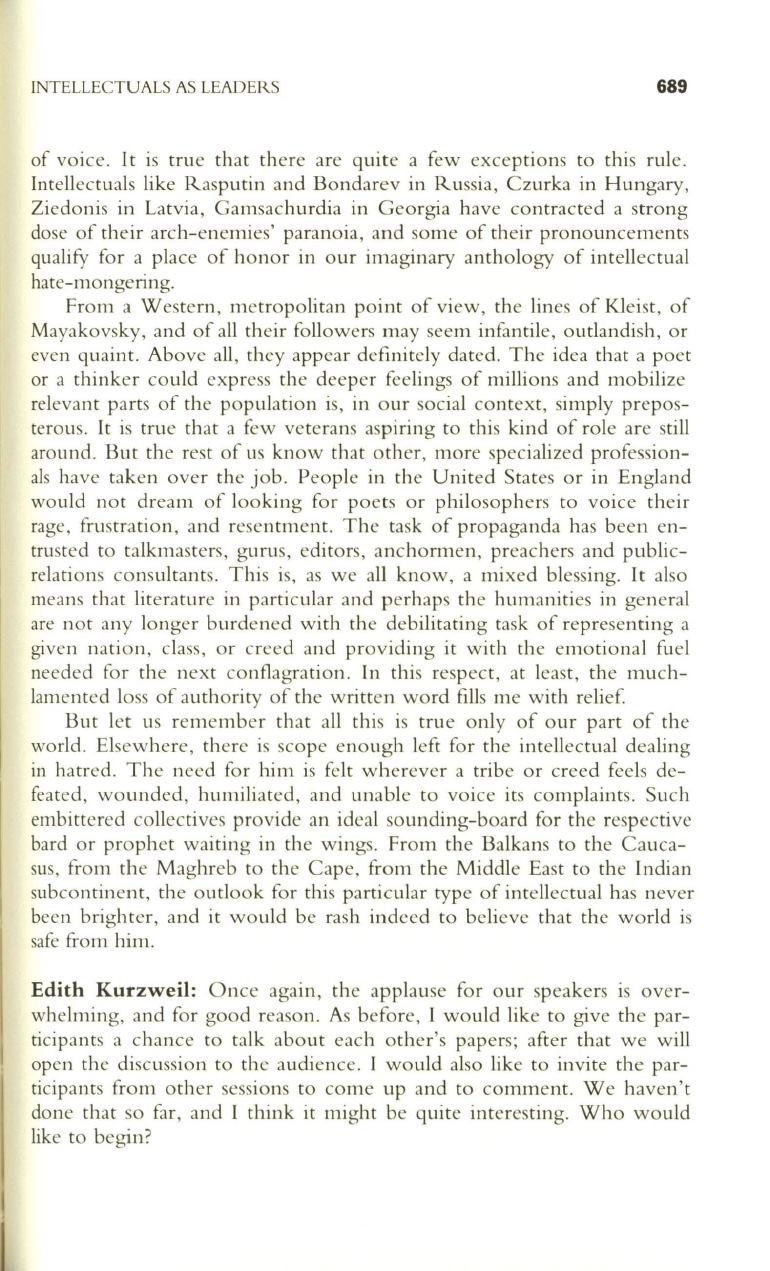
INTELLECTUALS AS LEADERS
689
of voice. It is true that there are quite a few exceptions to this rule.
Intellectuals like Rasputin and Bondarev in Russia, Czurka in Hungary,
Ziedonis in Latvia, Gamsachurdia in Georgia have contracted a strong
dose of their arch-enemies' paranoia, and some of their pronouncements
qualify for a place of honor in our imaginary anthology of intellectual
hate-mongering.
From a Western, metropolitan point of view, the lines of Kleist, of
Mayakovsky, and of all their followers may seem infantile, outlandish, or
even quaint. Above all, they appear definitely dated. The idea that a poet
or a thinker could express the deeper feelings of millions and mobilize
relevant parts of the population is, in our social context, simply prepos–
terous. It is true that a few veterans aspiring to this kind of role are still
around. But the rest of us know that other, more specialized profession–
als have taken over the job. People in the United States or in England
would not dream of looking for poets or philosophers to voice their
rage, frustration, and resentment. The task of propaganda has been en–
trusted to talkmasters, gurus, editors, anchormen, preachers and public–
relations consultants. This is, as we all know, a mixed blessing.
It
also
means that literature in particular and perhaps the humanities in general
are not any longer burdened with the debilitating task of representing a
given nation, class, or creed and providing it with the emotional fuel
needed for the next conflagration. In this respect, at least, the much–
lamented loss of authority of the written word fills me with relief.
But let us remember that all this is true only of our part of the
world. Elsewhere, there is scope enough left for the intellectual dealing
in hatred. The need for him is felt wherever a tribe or creed feels de–
feated, wounded, humiliated, and unable
to
voice its complaints. Such
embittered collectives provide an ideal sounding-board for the respective
bard or prophet waiting in the wings. From the Balkans to the Cauca–
sus, from the Maghreb to the Cape, from the Middle East to the Indian
subcontinent, the outlook for this particular type of intellectual has never
been brighter, and it would be rash indeed to believe that the world is
safe from him.
Edith Kurzweil:
Once again, the applause for our speakers is over–
whelming, and for good reason. As before, I would like to give the par–
ticipants a chance to talk about each other's papers; after that we will
open the discussion to the audience. I would also like to invite the par–
ticipants from other sessions to come up and to comment. We haven't
done that so far, and I think it might be quite interesting. Who would
like to begin?


